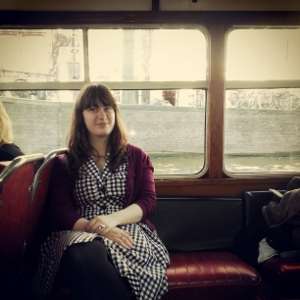The concert was divided into two clear parts; the first included string quartet pieces by Bryce Dessner, Nico Muhly and Sufjan Stevens, and the other half consisted of Planetarium, a multi-dimensional song-cycle for string quartet, trombones, piano, celesta, synthesizer, drums, drum machine, guitar and voice. The audience was completely different from what I usually see at concert halls – the average age seemed to be around thirty, and people clapped when they wanted to, not when etiquette suggests they should, which was quite refreshing and seemed appropriate in this setting.
The first half was flanked by two works that were not particularly impressive. Opening with Bryce Dessner’s Quintets, for string quartet and electric guitar, the Navarra Quartet were joined by the composer on stage. Even though the idea of adding an electric guitar to classical music is certainly not one I object to, I think the inclusion in this work made very little sense. Half the time it sounded like the guitar was just playing along with the string quartet, and the warm sound of the acoustic string instruments did not do the much more hollow sound of the electric guitar any favours: it sounded almost empty. There were some redeeming moments, in particular when the guitar played with just the viola, but overall Quintets failed to excite me. This is not because of the performance – the Navarra Quintet seemed to give it their all, and I was especially impressed by the second violinist Marije Ploemacher.
Sufjan Stevens’ Year of Our Lord is a small work for string quartet that contained some beautiful harmonies, but never really transcended the feel of background music. Perhaps this was emphasized even more because it followed Nico Muhly’s Diacritical Marks. Diacritical Marks opened with an energetic, fast movement containing lots of staccato, but quickly the music became more subdued and subtle, while still playing around with rhythms and harmonies. One of the most interesting things about it is that Muhly played around with the bowing techniques: in particular the second violin and viola often played their instruments with the side of their bow. This created an otherworldly sound when combined with the first violin and cello, which was absolutely mesmerizing. The Navarra String Quartet’s performance of Diacritical Marks was spot on, emanating the raw energy that piece contains with superb control and some surprisingly subtle moments.
Planetarium, a song cycle written by Bryce Dessner, Nico Muhly and Sufjan Stevens, was a completely different experience to the first half of the program. It is the type of music where you just have to leave all your preconceptions and judgments at home, and undergo the experience. Is it classical music? Probably not, despite some of the instruments and the thematic structure of the work. But does the genre matter? I highly doubt it. Of course when musicians blur the boundaries between genres people love to talk about crossover, about indie-classical and all other sorts of names invented for this particular purpose. But instead of discussing the pigeon-holing of music, it seems much more valuable to talk about the experience of listening to Planetarium.
This piece sings the praises of our universe, with songs titled ‘Neptune’, ‘Jupiter’, ‘Uranus’, ‘Venus’, ‘Mars’, ‘The Sun’, ‘Pluto’, ‘Moon’, ‘Saturn’, ‘Earth’ and ‘Mercury’. Its lyrics are inspired by mythology (Mars as the god of war, for example), astronomy and astrology – and musically each song has a very distinct feel. My personal favourite was ‘Jupiter’, a song full of force and aggression, yet strangely catchy and dance-like. The combination of all the different instruments worked really well, giving what could have been simple pop songs so much more dimension. Nico Muhly served as a conductor at times, keeping everyone in check, but I didn’t hear a single musician miss a beat. Speaking of beats, the use of drums (and drum machines) in Planetarium was very effective, and somehow worked especially well with the trombones, solidly played by the New Trombone Collective.
The songs ranged from loud and energetic to calm and slightly depressing – all the while lead by Sufjan Stevens’s beautiful voice. I found the experience of listening to Planetarium (and seeing it – there were some beautiful graphics projected onto a globe above the stage) quite overwhelming and at times emotional. It is such a complete piece of music, that somehow tied together beautifully. Apart from Stevens’ voice as a guiding light, I also found the use of the celesta wonderful, adding a bit of lightness to what was otherwise quite heavy music.
At times the sound left something to be desired – the string quartet was not always audible, and the vocals a bit on the loud side. Though it is easy to imagine that with a string quartet, seven trombones, a piano, celesta, synthesizers, guitar, drum kit and drum machine it will be difficult to get the sound absolutely perfect. I was somewhat disappointed by the use of the trombones in some songs; at times it seemed like lazy writing, with the trombones merely adding a few notes in the background – I can only imagine what extra dimensions would have been added to the music had their parts been more challenging. These are minor criticisms however, as overall Planetarium made a huge impression on me.


